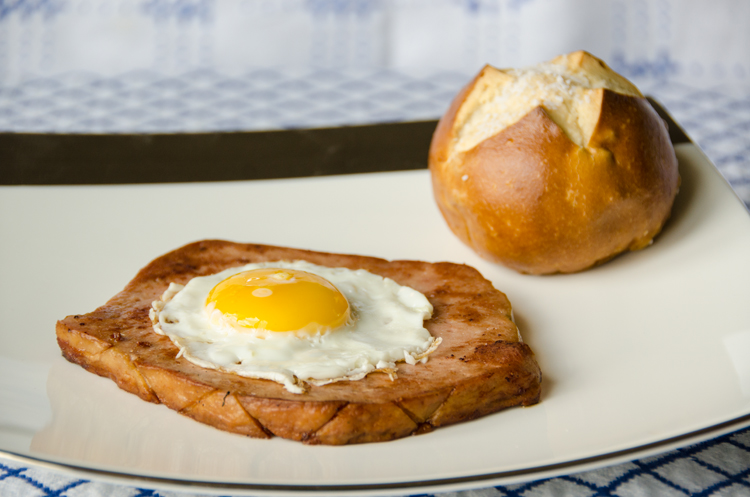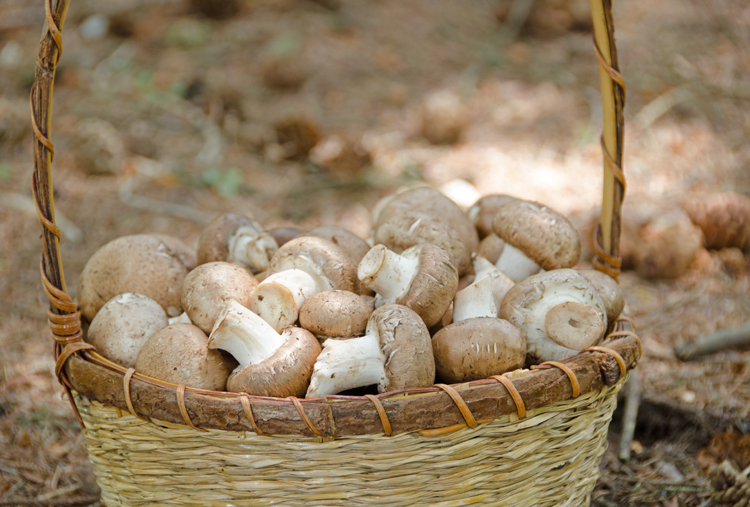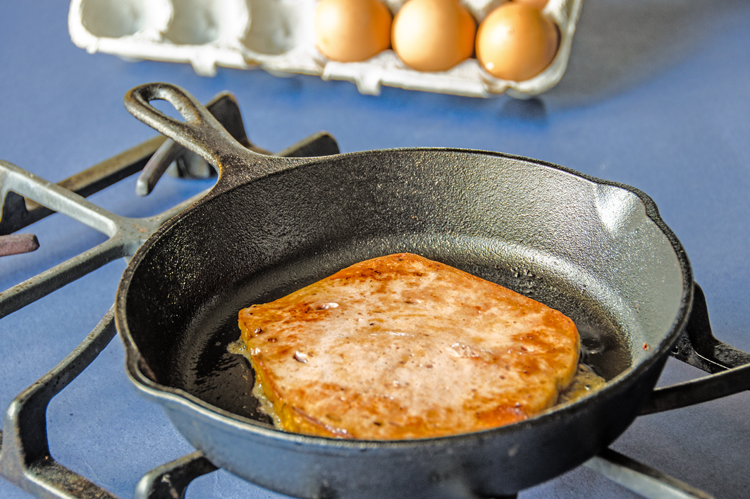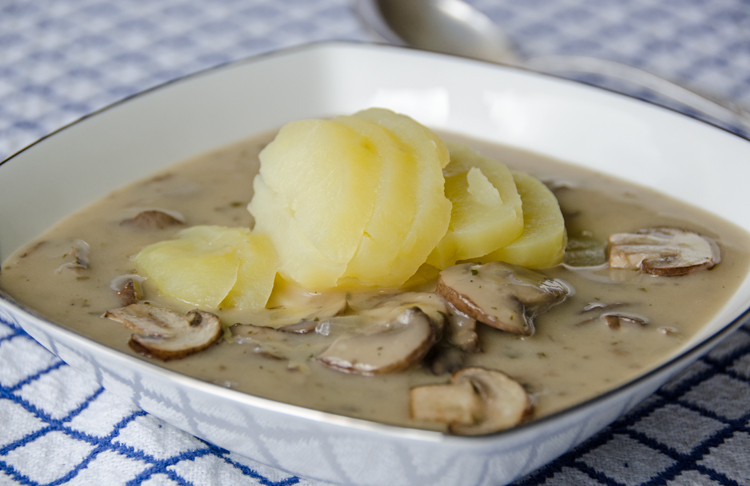If Karen from German Girl in America, whom I featured in a recent blog post, did not live at the other end of the country, I would have certainly invited her to our kitchen table and listened to her story over a German meal. She and I share the love for German food and the belief that food and personal memories are inseparable and intricately tied together. Family history becomes tangible when we use our mother’s apron and our grandmother’s recipes.
Annemarie’s Story, told by Karen
In Hollywood, there is a concept called a “meet-cute” which basically is the story of how two people met. In my world, the meet-cute story is that of my mother, Monika, and my Tante Annemarie.
You see, when my parents moved to California from Germany, they really didn’t know anyone. Dad worked all day, and mom stayed home in the apartment. Since they only had one car, she didn’t get out much. She spent the day taking care of their home, studying English, and on weekends they would go on drives to explore their new world. Still it must have been a bit lonely. One day the apartment manager told my father about a German woman who lived upstairs. Dad took my mom by the hand and led her off to meet the neighbor who shared their language. That’s how my parents met Annemarie and her husband Arnie. It was the beginning of a friendship that has lasted almost 50 years; through holiday gatherings, joint vacations, kids and grandkids.
 Annemarie is my Godmother, she is not a blood-relative, but in true German style, she was always referred to as “Tante”. I grew up with Annemarie’s kids, and often spent time in her home, and at her table, eating German and American foods. Her household wasn’t quite the same as mine, since Annemarie is married to an American. This slightly different perspective is why we chose to start here. She is someone who grew up in a German household, with German food, then came to America and experienced the different culture and lifestyle, while keeping many of the cooking flavors from home.
Annemarie is my Godmother, she is not a blood-relative, but in true German style, she was always referred to as “Tante”. I grew up with Annemarie’s kids, and often spent time in her home, and at her table, eating German and American foods. Her household wasn’t quite the same as mine, since Annemarie is married to an American. This slightly different perspective is why we chose to start here. She is someone who grew up in a German household, with German food, then came to America and experienced the different culture and lifestyle, while keeping many of the cooking flavors from home.
![]() What was the reaction of family and friends when you married an American and moved to the US in the late 1960s?
What was the reaction of family and friends when you married an American and moved to the US in the late 1960s?
We married in 1965, just six months after I had left Germany. My parents were devastated; they were hoping I would not stay in this far-away country. But we made up for it by spending many summers with them. My children were very close to their German grandparents.
![]() How difficult was it to maintain your language, and to teach your children German while living in the US? Especially since their father spoke very limited German?
How difficult was it to maintain your language, and to teach your children German while living in the US? Especially since their father spoke very limited German?
It was not that difficult to maintain my German because I still had close and regular contact with my German family, and the many German friends we made here. To teach the children German we took them to “German School” on Saturdays, but that was not enough to make them fluent in the language. Our long extended summer trips to Germany helped them catch on to the language.
However, we also had a hurdle to overcome: All my family speaks Bavarian dialect. The kids and my husband understand it, but they don’t speak it. However my husband liked to call me “Schnuckiputzilein”, abbreviated it was “Schnuck”. Not the easiest German word to pronounce!
![]() What was the biggest adjustment you had to make when moving to America?
What was the biggest adjustment you had to make when moving to America?
I had an English degree from a language school in Germany and was quite proficient in English both spoken and written. That was a blessing. It immediately got me a fantastic job; I was the secretary to the president of an electronics company. I had no negative experiences in America. Everyone seemed to accept a girl from Germany with a welcoming attitude.
I loved the new culture. I had known quite a bit about America through listening to AFN (American Forces Network Radio), especially all the Rock ’n’ Roll stuff, Chubby Checker, Elvis… Even Country and Western songs (before we realized they were country songs… ha, ha). We also had American movies and I loved it. I loved the easy lifestyle.
American food was a new adventure. It all seemed easier and less complicated than the sometimes tedious German meal preparation, and it was easy to adjust.
![]() You were lucky enough to go back to Germany often with the kids. I remember being a little jealous… and also, missing your family when you were away for the summer (and being astonished by the ten suitcases!). What was it like spending months in your old hometown for most of the summer? Was it easy to reconnect? Or did you feel like an outsider?
You were lucky enough to go back to Germany often with the kids. I remember being a little jealous… and also, missing your family when you were away for the summer (and being astonished by the ten suitcases!). What was it like spending months in your old hometown for most of the summer? Was it easy to reconnect? Or did you feel like an outsider?
We went back to visit every other year or so, and still do, lately without the kids and their family. My husband was a teacher, he had summers off, and we could stay six to eight weeks if we wanted to. We also had a house to live in, my parents kept the old house for us when they bought a new one. It is still available to us whenever we want to come.
To this day I have kept the friendships alive with my friends and classmates from my small hometown of about 10,000 inhabitants. Nowadays we can skype and e-mail, and are still very close. Whenever I am in Germany, we hold a “Klassentreffen” (class reunion) with our graduating class of 12 (classes where much smaller back then).
![]() One of my fondest childhood memories was how we spent Christmases together for many years, so you and my mother traded off cooking a goose. What German dish holds a strong memory for you? Is there a family dish that you really love?
One of my fondest childhood memories was how we spent Christmases together for many years, so you and my mother traded off cooking a goose. What German dish holds a strong memory for you? Is there a family dish that you really love?
Leberkäse mit Ei takes the top spot. My children and grandchildren love it, even my American son-in-law. My mother often made the obligatory Pork Roast Bavarian Style with lots of onions, and Cream of Mushroom Soup with the wild mushrooms they found in the forest on their walks.
Do you have a story to share about fulfilling your craving for German foods in America?
My nephew from Munich was visiting us here in California with his future wife, and knowing I love Obatzda, the pungent Bavarian camembert spread, he had several packages of it in his suitcase for me. California was not their first stop, and by the time they got to California, about five days later, you can imagine what this cheese and his suitcase, and everything in it, smelled like! It took lots of cleaning and days of airing out…
German Meatloaf with Fried Egg (Leberkäse mit Spiegelei)
In Annemarie’s house you will only find German lunchmeats. She has always lived near a German deli or butcher where she finds anything she needs. “We still love our German meals and treats,” she says, “and German sausages and Leberkäse are so quick and easy to fix. Now that the kids are out of the house and it is just the two of us, quick and easy is good.”
Leberkäse topped with an egg sunny side-up is not really a recipe: thick slices of Leberkäse are fried in a little bit of oil and topped with a fried egg sunny side up. That’s all. Classic German fast food at its best!
Annemarie’s Cream of Mushroom Soup
Instead of the wild mushrooms her mother used, Annemarie has found a way to make this thick soup in America with store-bought crimini or button mushrooms.
The special twist of Annemarie’s recipe is that the soup is served with a boiled potato.
3 tablespoons (40 g) unsalted butter
1 medium yellow onion, finely chopped
1 pound (450 g) crimini or button mushrooms, or ideally wild mushrooms, cleaned and sliced
2 tablespoons finely chopped flat-leaf parsley
Salt and freshly milled black pepper
3 cups (750 ml) vegetable broth or water, more to taste
1 cup (240 g) sour cream
½ cup (2 ounces/60 g) flour
White vinegar
6 to 8 medium potatoes, boiled in their skins and peeled while still warm
1. Heat the butter over low to medium heat in a large saucepan and sauté the onions until translucent, do not brown. Add the parsley cook for 1 more minute. Add the mushrooms and increase the heat to medium. Cook until they start to release liquid, stirring often. Season with 1 teaspoon salt and a bit of pepper. Add the broth, bring to a boil and cover. Simmer for 20 minutes.
2. In a small bowl, whisk the sour cream with the flour until well blended. Gradually add it to the cooked soup, whisking vigorously after each addition until it is fully dissolved before adding more. This is to prevent lumps. Bring the soup to a quick boil and continue whisking. It will be quite thick. Add more broth if you prefer a thinner soup. Season with a dash of white vinegar, salt and pepper. Serve hot with a boiled potato in each bowl.
Makes 6 to 8 servings
Icon made by Freepik from Flaticon licensed by Creative Commons BY 3.0.





May 23, 2015 at 5:33 pm
When I go home I have to have a Broetchen with warm Leberkaes
! Leberkeas mit Ei is a close second!
May 27, 2015 at 3:12 pm
OMG Leberkäse – or Fleischkäs, as we call it in my dialect – it must be what I miss most about my country! I am dying to try making it, all that’s missing is some hardware to cut and cool the meat …
June 19, 2015 at 9:46 pm
Really interesting !!! the recipes seem to be delicious!!!
Pingback: Five Foods To Try In Germany - The Red Headed Traveler